If you keep to intermittent fasting with no more than 24 hours between meals, you won’t need supplements. When doing a prolonged fast though, meaning more than five days, your body will deplete itself of some essentials minerals, electrolytes, and vitamins. So, it’s perfectly normal to help it get through this shock with supplements.
The most important supplements to take when fasting is electrolytes like sodium, potassium, or magnesium. Other supplements can help with the fast and your overall feeling, but they won’t be as necessary for your body as those minerals.
Aside from what your body needs, you can also ease a fasting period with supplements, they can: improve your energy overall, help with muscle recovery, ease your gut bacteria, etc.
With our bad habits, fasting comes as a shock to the body, let’s see how we can lessen the impact of fasting with vitamins and supplements.
Why Should you Supplement When Fasting?
On intermittent fasting or even 7 days fast, you won’t need to supplement. You might feel drowsy, fatigue, headaches, stomachache, all these are symptoms that come with fasting.
Your body is a strong machine, seven days with no food is a shock, but it’ll get through it. And even though some of your vitamins or minerals stores might get depleted during the fast, it certainly won’t kill you.
But I would advise you to be prepared. You can read everything you want on the subject, I can give you all the crap in the world about the side effects in the first days, the regain of energy on the fourth or fifth, the fact that you won’t be hungry anymore, etc. fasting is different for everybody.
So taking supplements depends on you and how you feel. It might make things easier, it might help you get through a rough few hours when you feel very low on sodium, it might help with muscle cramps or recovery, give you energy, etc.
You shouldn’t consider all this as a prerequisite. I never supplemented when doing a 7 day fast, unless I needed to. So I take magnesium on a daily basis and it was no different when fasting. I also took sodium once or twice on the fourth day, when I was really feeling down.
Again, I’m mostly advising you to be prepared, to have some of the most important ones (mostly electrolytes), and even some enhancers depending on how active you’ll be during the fast, on hand.
You don’t need to supplement, but you should be aware of how supplementing might help you. Maybe on your first fast, things will get so hard, you’ll be more prepared next time.
If you follow a good healthy diet, you mostly won’t have to supplement with vitamins during a fast, except if you plan on fasting for a very long time, like 20 – 30 days. In which case you shouldn’t be getting all your info from a guy on the Internet, you should talk to a doctor beforehand.
How And When To Take Supplements?
I’m going to talk about many supplements, but it’s important to know when and how to take certain types of vitamins and the side effects you could get from it.
Don’t worry, the benefits will exceed the potential ill-effects of it, but it’s important that you really understand this.
There are two types of vitamins :
Water-soluble: These vitamins can be taken on an empty stomach, during a fast. They are not stored in your body but excreted during the day when you’re drinking. But some of these vitamins, like B-Vitamins, might upset your digestive system if taken while fasting. Most of these water-soluble vitamins won’t get depleted in one or two days, but they could come in handy around day five.
Fat-soluble: Your body won’t absorb these vitamins if they’re not taken with some sort of fat, meaning you should restrain those vitamins to your eating windows. You’ll take those with food including fat. These include vitamin A or K. During the first days of a prolonged fast, you’ll be able to get those vitamins from the fat from your body that’ll get burned out.
Supplements On Intermittent Fasting
These supplements can be taken on any kind of fast, but they would be a great fit for intermittent fasting.
Your body won’t need or crave them, they can simply help you get through a fast and improve your overall condition (mental focus, energy, etc.).
They’re more enhancers or facilitator than requisites.
L-Tyrosine
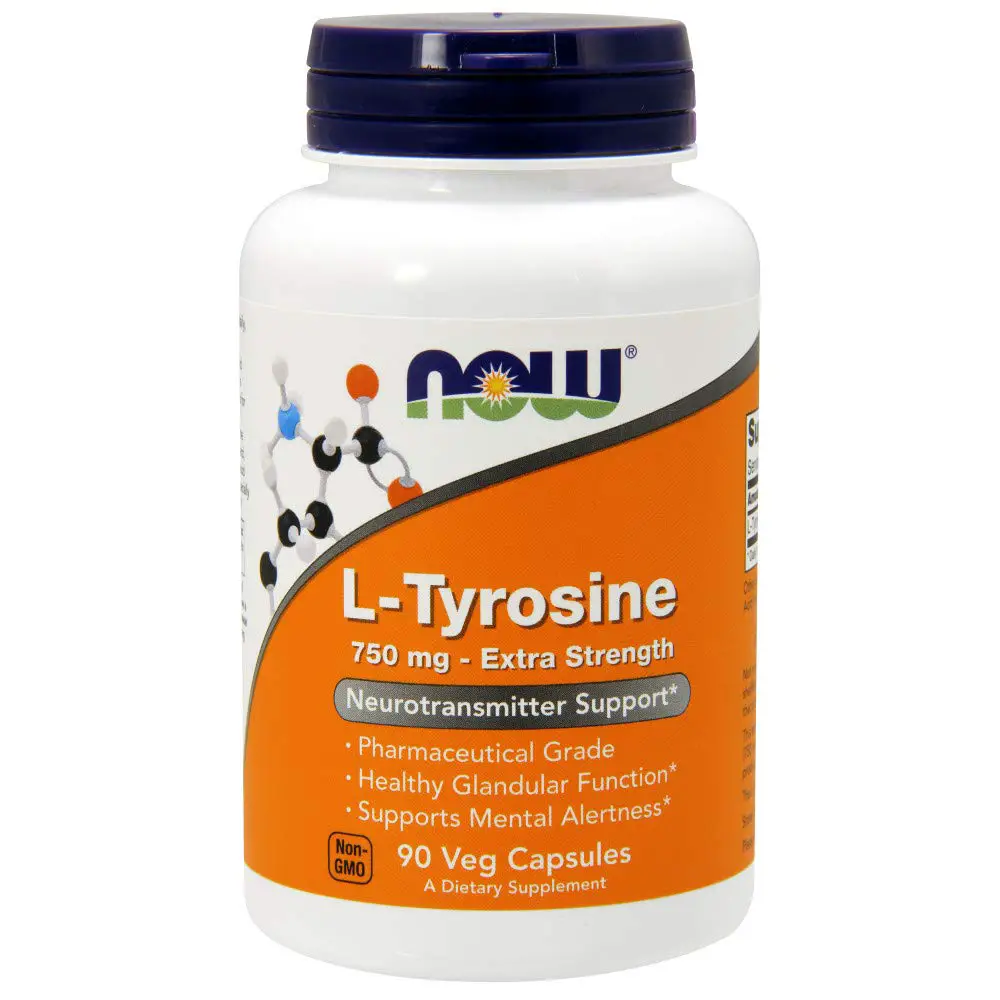
Once taken, the brains turn L-Tyrosine, which is an amino acid, into three neurotransmitters:
- Adrenaline: As you know, adrenaline is a natural stimulant that affects the autonomous nervous system. The later controls body functions such as dilatation of pupils, heart rate, secretion of saliva, sweat. It helps with energy and focus.
- Dopamine: This is also known as the pleasure hormone, a rush of dopamine can come from accomplishing something, doing exercise or simply flickering through social media. In short, it can improve your mood.
- Norepinephrine: Also called noradrenaline, increases heart rate and blood pressure, increases the blood flow to muscles, releases glucose from stores, etc. It helps the body deal with stress and muscle recovery.
This might help when trying intermittent fasting or when starting a prolonged fast, to avoid fatigue, improve your mood, energy, and focus.
Since you’re, ironically, stressing your body when fasting, L-Tyrosine can help reduce this initial stress and helps you through the most difficult parts of implementing fasting: the beginning.
L-Tyrosine can be taken on an empty stomach.
You can find 750 mg caps from NOW supplements on Amazon.com.
Apple Cider Vinegar
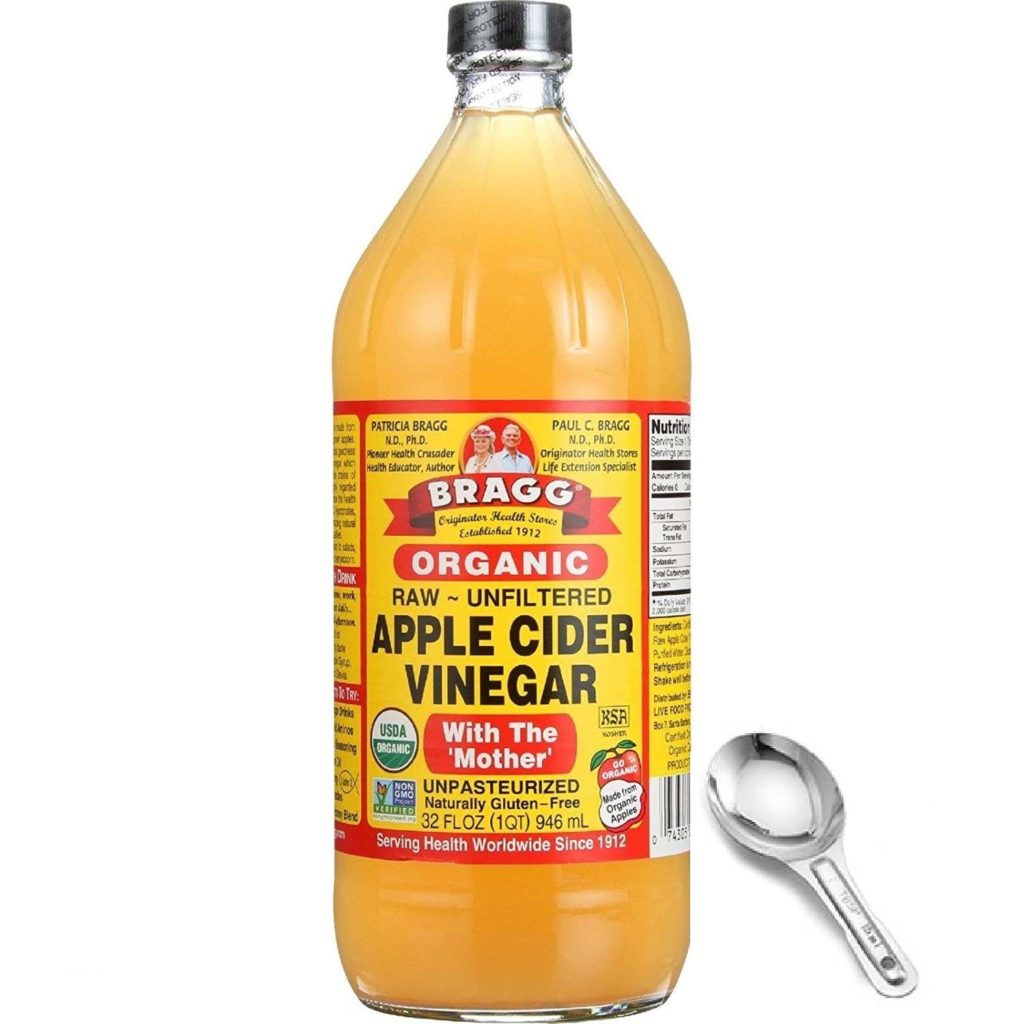
If you read my other articles, you might think I’m starting to sound like a broken record, ranting about Apple Cider Vinegar. You may also think that it’s not exactly a supplement right?
I would totally consider it a supplement, while it’s not a vitamin nor a mineral, it’s still a healthy supplement that can help you on a daily basis with intermittent fasting.
Apple Cider Vinegar’s many benefits include :
- Balancing PH levels, which can help decrease stomach acidity you can experience when fasting
- Helping stabilize blood sugar and insulin levels
- Improve good gut bacteria and kill the bad one
But by far the most important effect of Apple Cider Vinegar, which can really improve the intermittent fasting experience, in the beginning, is that it can help you feel satiated more quickly when eating.
It can also help suppress appetite. I haven’t really felt that when taking ACV, to me it’s not as effective as coffee in that regard, but still, I’ve read many people claiming it helps.
You would have to dilute it in water to absorb it in its original form. ACV won’t produce an insulin response and, even though it has some calories and technically breaks a fast, it’s advantages will far outgrow this technicality.
But you might not like the taste of it. You could try improving it by mixing some other ingredients with it to make it palatable. If you’re bored with water, tea, and coffee, ACV can actually be a great alternative. I used to do big bottles of ACV mix to give some more taste to my daily water intake.
But if the taste of ACV really rebukes you, you could simply turn to capsules. For example these 450g nutritional supplements pills from Now.
Turmeric
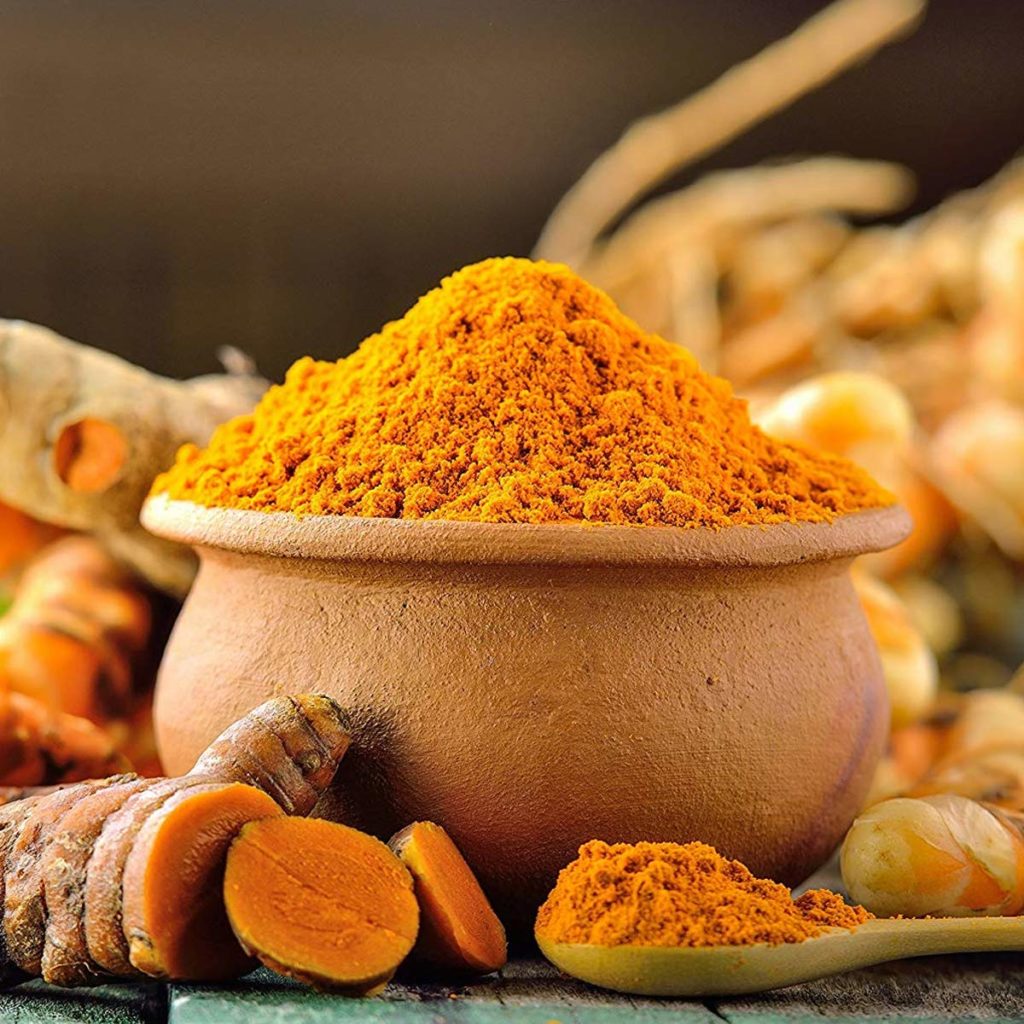
Again, not exactly a supplement, but a product packed-full with health benefits that can help you on everyday intermittent fasting: turmeric.
Before we talk about its benefits, you may already like the taste of turmeric. And I’ve seen people adding some to their green tea or even coffee to add some flavor.
But the great benefits of turmeric include:
- It’s anti-inflammatory
- It boosts brain-derived neurotrophic factor, improving brain-functions
- It can work as an antidepressant
In Japan, a beverage called Ukon No Chikara can literally be translated as turmeric power. This is often taken before hanging out with friends, to prevent the ill-effects of a hangover. Turmeric can help reduce acetaldehyde in the blood after drinking alcohol.
Turmeric anti-inflammatory benefits have also been found to help with many other diseases (Alzheimer, Crohn’s disease, cancer, diabetes, heart disease, etc.). The list is pretty long, but the main takeaway is this: turmeric can really help when it comes to pro-inflammatory diseases.
Ok but what about fasting? Well, as I stated earlier, with such benefits you could consider drinking turmeric in your tea just for the flavor and the anti-inflammatory effects. But turmeric also has a good impact on gut bacteria.
It’s been found to help increase good bacteria in the gut. When you’re experimenting with fasting, you could experiment bloating, gas or indigestion when eating, turmeric could simply help elevate those effects.
You can either get turmeric as powder if you like the taste of it or more simply as capsule supplements, like these ones from Pure Organic Ingredients.
Oh, and you might wonder what’s the difference between turmeric and curcumin. Well, turmeric is the root and curcumin is simply the extract of it. So, all in all, it’s pretty much the same thing.
Supplements On Prolonged Fasts
These are more specific to a few days, or more, of fasting. They mostly consist of electrolytes, minerals essentials to your body, that can get depleted during a fast.
And you might think it’s overkill, but getting muscle cramps because you don’t have enough magnesium or feeling drowsy for a lack of sodium or potassium, is quite common on a prolonged fast.
Of course, it’ll depend on how your body handles those minerals, you might not need any of this. Personally I need to take magnesium every day to avoid muscle cramps, which I get quite often, so on a fast, I take this religiously.
Magnesium
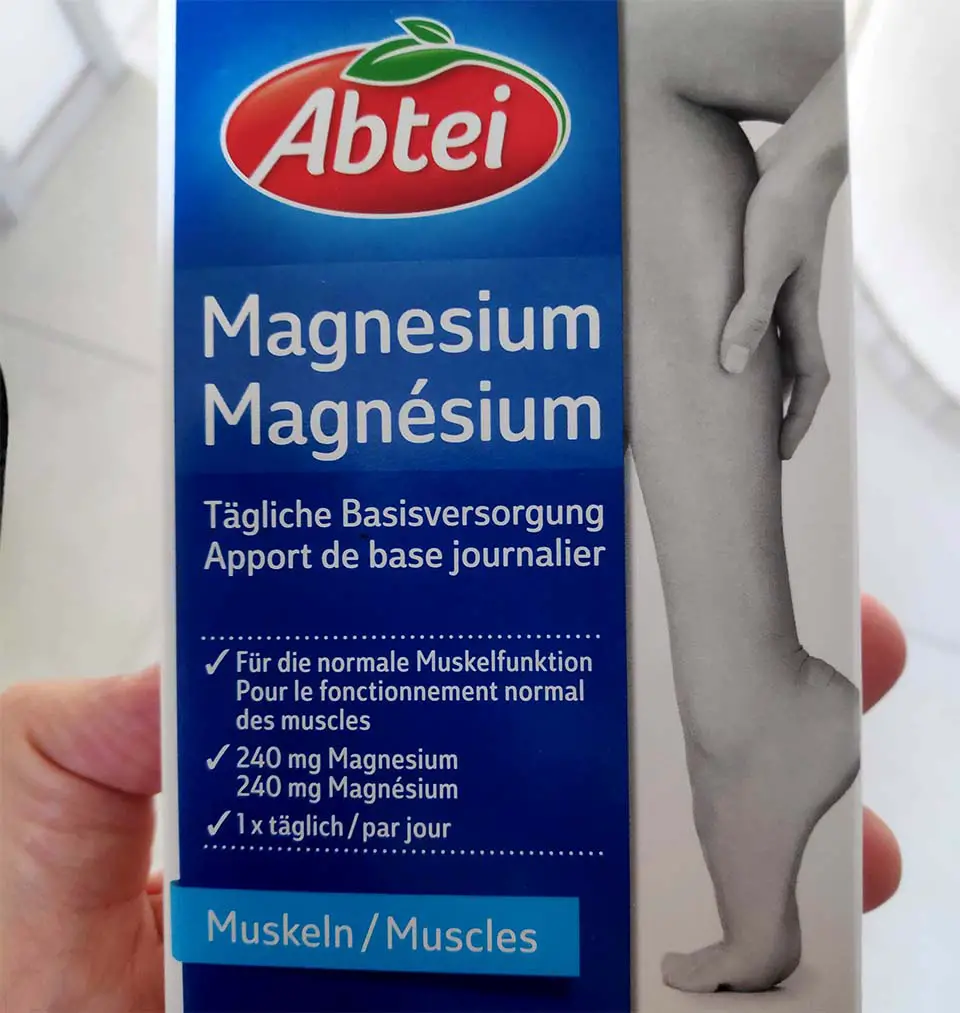
Magnesium is one of the essential minerals your body needs to function, it is needed for more than 300 biochemical reactions in the body, such as:
- Keeping a steady heartbeat
- Adjusting blood glucose level
- Aiding production of energy and protein
- Helping keep bone integrity
- Maintaining nerve and muscle function
- Supporting a healthy immune system
Magnesium is so important that the kidney will limit urinary excretion of the mineral in order to avoid magnesium deficiency. Deficiency can include fatigue, nausea, vomiting, and weakness.
And of course, as I mentioned earlier, muscle cramps, numbness, tingling, and if it worsens it can go as far as seizures or coronary spasms.
It most likely won’t get as bad when fasting, except if you have a pre-existing condition, but supplementing with magnesium can help get rid of some of these symptoms. It is also known to help improve sleep (which isn’t always ideal when fasting).
You can either absorb magnesium in caps daily, like these ones on Amazon, or you can put magnesium flakes in your bath. The later can be great to recover after a heavy workout for example.
Sodium
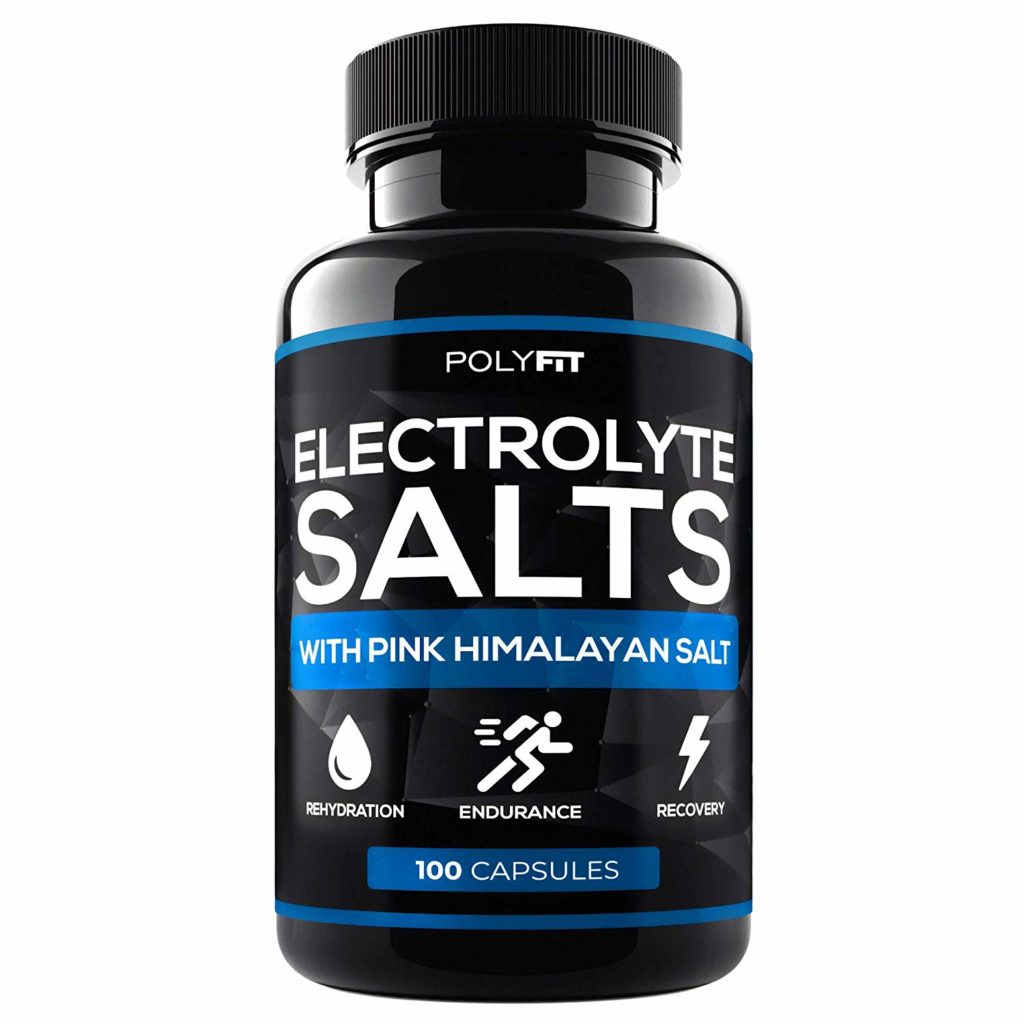
Sodium is the other big mineral your body needs to function. Most of it is located in the blood or around cells. The main function of sodium is to control blood volume in the body.
The total amount of sodium in your system directly affects how much fluid in your blood, called blood volume, and around your cells, you’ll have in your body.
Sodium concentration is a really important factor in the body if it’s becoming too low or too high, receptors in the heart, kidneys and blood vessels will trigger stimulation of the kidney in order to increase or decrease sodium excretion. Thus affecting blood volume.
But that doesn’t mean your body cannot get sodium imbalance. When fasting, the risk could be to get very low sodium levels in your body. This is called hyponatremia.
Symptoms of hyponatremia could be sluggishness and confusion at first. This occurs because the brain will be the first to be affected by low sodium and will start dysfunctioning. Then muscle twitching and even seizure can occur.
This study analyzed the effect of various lengths of water fasting on 768 patients, trying to determine if fasting is safe to implement. There were two serious events that lead to hospitalization during the study.
One of them was a case of hyponatremia in a 70 years old man, around day 9 of a water fast. The patient was then treated with IV electrolytes and fully recovered. Hyponatremia is more of a risk with age.
One of the other factors in getting very low sodium in the body is excessive fluid consumption. Meaning if you drink a lot, sodium levels will go down, and during a water fast, you’ll be drinking around 4, 5 liters of water a day, so that won’t help with sodium levels either.
But even if you’re fasting for several days, you won’t get into hyponatremia in a matter of minutes. Your body will tell you you lack sodium.
It occurred to me once, feeling really tired, unable to concentrate, dizzy, on my fourth day of a water fast. Somehow I knew I was lacking sodium, so I drank a small vegetable broth and 15 minutes later I was fine.
To avoid taking a broth that would break the fast, you can simply dilute some salt in water in order to get some sodium. Better then you can use :
- Pink Himalayan salt, which is an excellent source of sodium
- Electrolytes Salt Tables, with pink Himalayan salt, which can be taken every morning and will keep your sodium levels in balance
Potassium
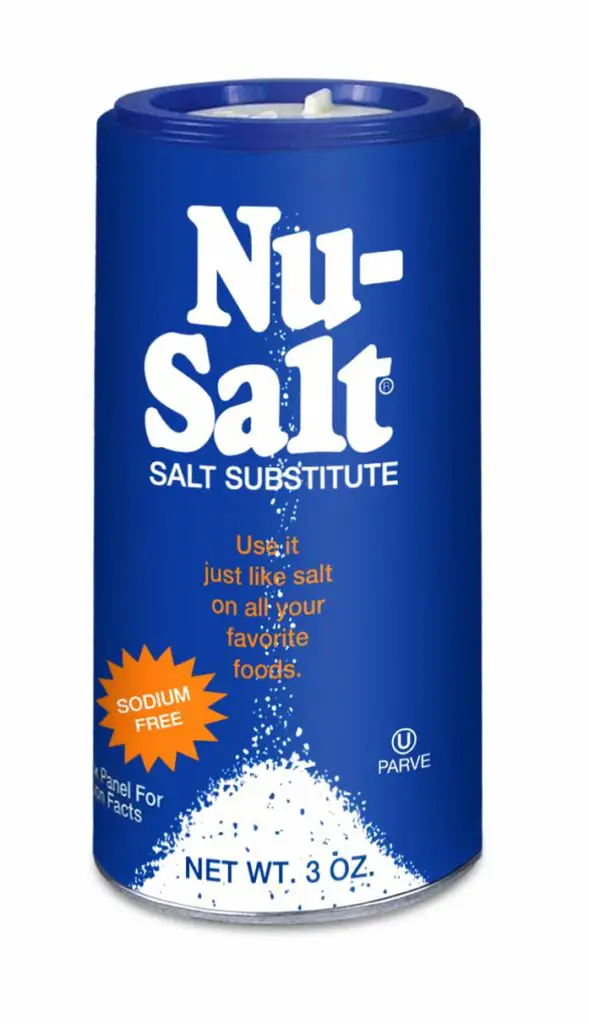
The third most abundant electrolyte in your body is potassium, it’s mainly found in muscle cells, but also in the bones, liver and red blood cells.
In your body, most of the water is called intracellular fluid (ICF), meaning its fluid inside of your cells. While the remaining is called extracellular (ECF) fluid, which can be found around the cells, in the spinal fluid, and in the blood.
While sodium will regulate ECF, potassium will be the one responsible for regulating the amount of ICF, meaning the amount of water inside the cells.
So the role of potassium is quite similar to the role of sodium: regulating fluid balance in the body. Potassium generally works in pairs with sodium, for example, the nervous system uses both electrolytes for nerve impulses.
Nerve impulses are messages from the brain to help regulate muscle contractions, reflexes, heartbeat, etc.
Ill-effects of low potassium in the body are generally linked to low sodium. Those two are linked, if you get enough sodium, potassium shouldn’t be an issue. Table salt contains both sodium and potassium.
If you only want to supplement on sodium, you could try using Nu Salt, which is sodium-free salt or Potassium Chloride Powder from NOW that is also sodium-free.
B-Vitamins

There are many types of B-Vitamins, but the most important ones are :
- Thiamine (B1): The body needs thiamine to make adenose triphosphate. This molecule is responsible for transporting energy within cells, helping convert food into energy, by regulating glucose metabolism.
- Riboflorine (B2): Helps to regulate amino-acids in the body, involved in cellular repair and muscle growth. B-2 also supports other body functions that give you energy.
- Niacin (B3): It helps reduce cholesterol levels and risks of heart disease.
- Folate (B9): Helps regulate the production of red blood cells, which can be important on a fast since other electrolyte imbalance can affect blood pressure.
You most likely aren’t going to take all B-Vitamins separately, what you’ll take is a vitamin-B complex, which includes most of those and then some.
On a fast, taking vitamin-B complex can have two main benefic effects:
- Reducing stress in the body by improving cognition and mood, according to this study.
- Once you start eating again the metabolic benefits of B-vitamins will help your body absorb the nutrients better
You can easily find tablets of vitamin B complex on Amazon, like this one from Lindens or that one from BioGanix.
Supplements When Working Out On A Fast
Not all of these are specifically about working out when fasting, but they’re aimed at helping muscle growth or recovery, providing you energy, boosting testosterone, etc.
When on a fast, it’s important to exercise as much as possible, being lethargic might lead to muscle loss. Tim Ferris addressed this in his book Tools of Titans when experimenting with prolonged fast.
He first did a 7 day fast in a hospital and wasn’t allowed to exercise for the whole period of the fast. He ended up losing around 6 kg of muscle mass.
Later, he tried a 10 day fast, without clinical supervision this time, keeping is exercise routine, walking, etc. He didn’t lose a gram of muscle during this fast.
Zinc

Zinc is another one of the essential minerals your body needs. It’s required for many things, such as :
- Immune functions
- Growth and development
- Wound healing
- Enzymatic reactions
- Protein and DNA synthesis
Zinc is present in every cell of the body and it’s actually the second most abundant mineral in your body, after iron. So, zinc he’s involved in a great many processes in the body.
Specifically, zinc is known to help rise up levels of testosterone, in men especially. It’s been found that low zinc usually means low testosterone. I wasn’t able to find a study stating how those two are linked.
But this study on the effects of magnesium and zinc supplements on men found out that getting 30 milligrams of zinc every day significantly raised testosterone levels.
Testosterone is a sex hormone, responsible for many things, including regulating libido, muscle mass, strength and the production of red blood cells. It’s also known to help muscle growth, increase endurance and performance.
You can find zinc from NOW as capsules here but also as liquid concentrate from Eidon Ionic Minerals.
Beta-Alanine

Beta-alanine is a non-essential amino acid, unlike many amino acids, its purpose is not to synthesize protein. In essence, beta-alanine is a performance enhancer.
How so? Well, coupled with histidine, another amino acid, beta-alanine will produce carnosine, which is then stored in your muscles. And carnosine will reduce lactic acid production in the muscles, improving athletic performance.
Let me clarify: when you’re exercising, your body will start by breaking down glucose, through a process called glycolysis, for energy. The muscle will break down glucose into lactic acid.
In the process, your muscles will become more acidic, which can then block the breaking down of glucose and lead to muscle fatigue. The more carnosine in the muscle, the less acidity. Carnosine will work as a buffer preventing them from getting tired as quickly.
Many studies have shown that supplementing with beta-alanine, increased carnosine levels in the muscle by up to 80% leading to better athletic performances.
Exercising on a fast is important, but depending on the type of fast, it can be hard. Let’s say you’re on day three or four of a fast, you’re body hasn’t fully committed to body fat as your main source of fuel, supplementing with beta-alanine might help combat this fatigue. Or at least, lessen it.
You can get beta-alanine as a powder from Now Sports at Lucky Vitamin.
L-Citrulline

Another non-essential amino acids, citrulline is, like beta-alanine, also not used in the body for protein-synthesizing. One of the effects of citrulline is that it’ll widen arteries and veins. This is called vasodilation. Vasodilation can improve blood flow to tissues and blood pressure.
Based on this, some studies have been done on citrulline to see how it affected both endurance and weight training.
In endurance training, it has been found to help improve oxygen content and usage in the muscles. But citrulline supplementing doesn’t have an immediate effect on this, you should supplement every day for a few days before these improvements occur.
Concerning weight training, one study showed impressive results when supplementing with citrulline: a 53% raise in repetitions when weight lifting, compared to those getting a placebo.
And the icing on the cake: patients supplementing with citrulline experienced 40% less muscle soreness in the two days following the workout.
Here are 750 mg capsules from Now you can find at Lucky Vitamin.
L-Arginine

If you try to look for L-Citrulline supplements on the web, you’ll likely find many products coupling it with L-Arginine. When citrulline is consumed, some of it will be turned into another amino acid: arginine.
So basically, L-Arginine is also a byproduct of L-Citrulline. Studies even showed that to increase arginine in the body, it’s more effective to get citrulline that arginine supplements.
While I wouldn’t particularly advise supplementing solely on L-Arginine, you could supplement with capsules coupling L-Arginine and L-Citrulline.
This way you’ll improve the overall benefits of the caps, resulting in most of the good effects I mentioned about L-citrulline: better overall performance when exercising, either when doing endurance or weight lifting.
You can get 500 mg arginine supplements from Now on Lucky Vitamin.

